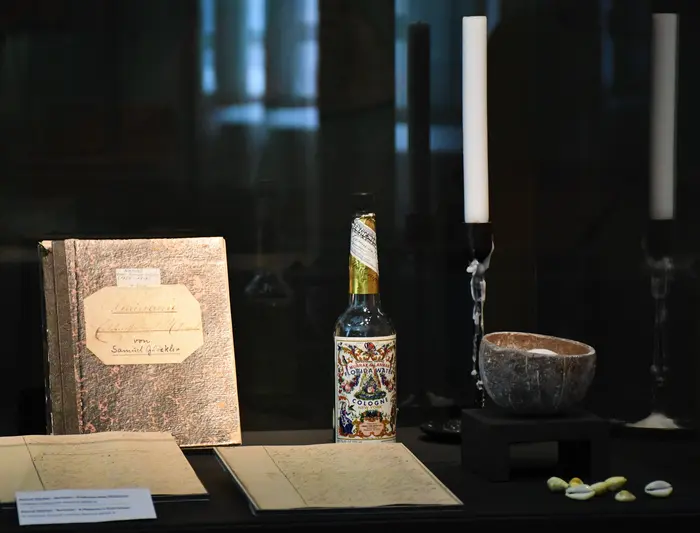Jaasir Linger: Intervention Winti, 2022
translated by: Sala - sensitivity reader and translator
Winti Religion
Winti is an Afro-Surinamese religion. Enslaved Africans formed this new syncretistic religion from their native gods and beliefs. Winti was secretly practiced on the plantations and by the Maroons in the jungle. It helped the enslaved and Maroons persevere through harsh working and living conditions. Central elements of Winti are a sense of harmony with one’s human, natural, and divine environments, as well as worship of God(s) and ancestral spirits.
bild

text 2
Moravians and Winti
The Moravian Church sent missionaries to Suriname in 1735, but the Dutch colonial government forbade enslaved people to become Christians until 1760. The missionaries, thus, focused on the indigenous population and Maroons. When they started to proselytise on the plantations after 1765, Winti was already the dominant religion. However, colonial officials and missionaries saw Winti as idolatry and devil worship, as in the document shown here: In his diary, Missionary Glöckler describes his observations of Winti practices among black people in Suriname.
The abolition of slavery in 1863 gave way to decades of economic, cultural and mental oppression. The former enslaved were forced to convert to Christianity, or lose access to education. The native language, Sranan Tongo, was prohibited even in schools. Winti practice was outlawed until 1971, and punished by harsh fines and prison sentences.
Although the government and the church have long tried to suppress Winti, it persevered in secret. Since the end of prohibition in Suriname, Winti has become an officially recognized practice. In 2012, ten thousand Surinamese registered as Winti believers for the census and, in 2015, Dorena Babel became the first Okomfo, a Winti priestess recognised by the Surinamese government. Today, Winti is not only practiced in Suriname, but also in the diaspora in the Netherlands and Belgium. Some shops in the Netherlands even sell Surinamese traditional and spiritual items.
vita
Jaasir Linger (b. Zoetermeer, The Netherlands, 1991) is a visual artist with Surinamese roots, based in Rotterdam. Through a process of personal exploration and an investigative attitude towards his Surinamese roots, the Afro-Surinamese religion Winti and the shared Dutch-Surinamese / Surinamese-Dutch history, he creates art- installation works. For Linger Winti is a means to (re)connect with his roots and recurs in all his art-installations.
Linger is engaged in ongoing research and art projects concerning Surinamese cultural heritage, decolonisation and blackness. His works have been showcased in art institutions such as ‘Museum Het Rembrandthuis’, ‘Amsterdam Museum’, museum ‘Het Nieuwe Instituut’, ‘CBK Zuidoost’, ‘The Black Archives’, and ‘Documenta 15’.



